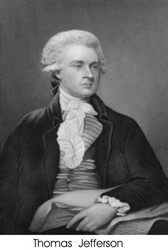Was Thomas Jefferson A Federalist
|
| updated |
Copy Link Code
|
 When representatives of the colonies came together for the Constitutional Convention of 1787, the differences in their political views and ideals were stark. Despite the warnings of many Founding Fathers, including Thomas Jefferson, political factions developed that would become the progenitors of America's first political parties. The most identifiable differences revolved around the size and role of a centralized government. Jefferson was in France during the Constitutional Convention, but he managed to have an influence through written correspondence with many of the representatives. The most effective publications to influence opinion on the structure of federal government which were written by political rivals of Thomas Jefferson; Federalist Papers compiled essays from prominent patriots James Madison, Alexander Hamilton and John Jay. Was Thomas Jefferson a federalist? No. Was Thomas Jefferson an anti-federalist? Yes, and the first evidence of his views on centralized government appears in the individual protections of the Bill of Rights.
When representatives of the colonies came together for the Constitutional Convention of 1787, the differences in their political views and ideals were stark. Despite the warnings of many Founding Fathers, including Thomas Jefferson, political factions developed that would become the progenitors of America's first political parties. The most identifiable differences revolved around the size and role of a centralized government. Jefferson was in France during the Constitutional Convention, but he managed to have an influence through written correspondence with many of the representatives. The most effective publications to influence opinion on the structure of federal government which were written by political rivals of Thomas Jefferson; Federalist Papers compiled essays from prominent patriots James Madison, Alexander Hamilton and John Jay. Was Thomas Jefferson a federalist? No. Was Thomas Jefferson an anti-federalist? Yes, and the first evidence of his views on centralized government appears in the individual protections of the Bill of Rights.
When Washington was elected almost unanimously as the first President of the United States, he tried to bring on a cabinet of diverse, prominent minds like Alexander Hamilton and Thomas Jefferson, federalist or anti-federalist. It was not long before Jefferson, as the Secretary of State, was bumping heads with Hamilton, the Treasury Secretary. Hamilton had enormous influence over the Washington Administration and the national fiscal policy he was moving to implement set off alarm bells for anti-federalists like Jefferson. In 1789, together with moderate federalist James Madison, Jefferson established an unofficial political faction known as the "anti-administration party," progenitor of the Democratic-Republican Party formed two years later. They were particularly worried about the greedy inclinations of Hamilton and his wealthy banker allies whom they declared American "royalists." In 1794, Hamilton, the great rival of Thomas Jefferson, founded the Federalist Party with an amalgamation of support from urban bankers and businessmen.
The Presidential Election of 1796 would pit the leader of the Democratic-Republican Party, Thomas Jefferson, against his longtime friend John Adams, the Federalist candidate. Although Adams won narrowly, the contemporary rules called for the runner-up to serve as Vice President; thus, Jefferson would serve another term under an administration he did not support. It was in this time that the Reign of Terror in France became especially bloody, but for Thomas Jefferson, anti-federalist views meant support for the Revolutionaries. In the nascent United States, many Federalists feared a spillover of dissidence towards government. When Adams asserted federal authority with the Alien and Sedition Acts, he inflamed support for the opposition and appeared to validate Jefferson's views. In the election of 1800, Jefferson defeated Adams after breaking a deadlock with Aaron Burr. As president, Jefferson was unsuccessful in repealing many of the policies and institutions established by his predecessors. Some historians have pointed out hypocrisies in Jefferson's own handling of the presidency, including the intrusion of government in commerce with the Embargo Act of 1807. Although he did not aggressively grow the national government, with the Louisiana Purchase of 1803 President Jefferson nearly tripled the territory of the young United States.
